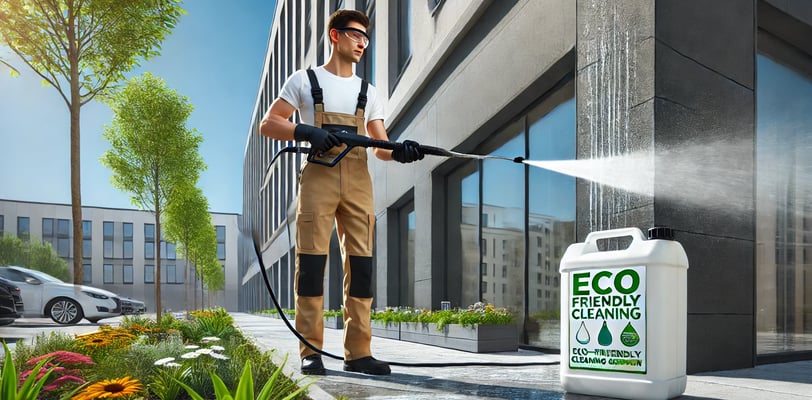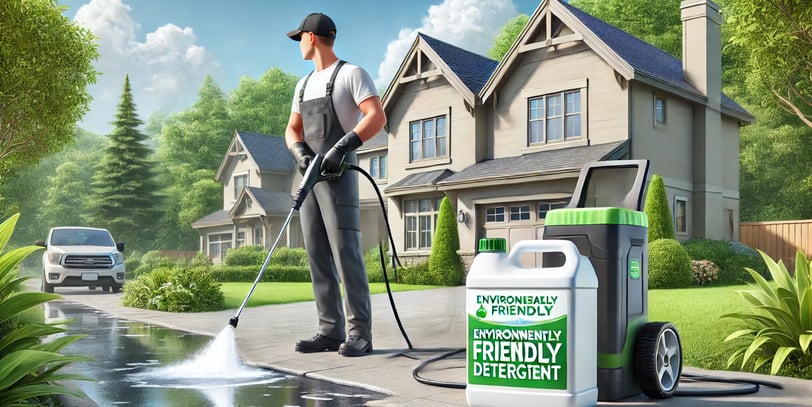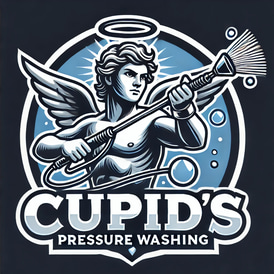Eco-Friendly Pressure Washing Solutions for Businesses in Metro Manila
Learn how pressure washing services use eco-friendly services to maximize your investment and ensure that you can make the most of it for your business. Our guide will explain all the important information below.
PHILIPPINESMETRO MANILA MAINTENANCECOMMERCIAL CLEANING SOLUTIONSHOME IMPROVEMENT TIPS
11/21/20245 min read


The Importance of Eco-Friendly Pressure Washing
As businesses in Metro Manila continue to grow, the importance of adopting eco-friendly pressure washing solutions becomes increasingly evident. Traditional pressure washing methods often rely heavily on harsh chemicals and excessive water usage, resulting in detrimental effects on the surrounding environment. These practices can lead to water pollution, which not only impacts local waterways but also endangers wildlife habitats. Furthermore, the runoff from these cleaning processes can introduce toxins into the ecosystem, posing long-term challenges for urban biodiversity.
In contrast, eco-friendly pressure washing employs sustainable techniques that minimize environmental harm. By utilizing biodegradable cleaning agents and reducing water consumption, businesses can actively contribute to the conservation of natural resources while effectively maintaining their premises. Such practices address urgent environmental issues and align with the growing global emphasis on sustainability and corporate social responsibility. Companies adopting these green practices are more likely to resonate with environmentally conscious consumers, enhancing their reputation within the marketplace.
Beyond ecological benefits, eco-friendly pressure washing can lead to substantial operational advantages. Businesses that prioritize sustainability often find themselves in a favorable position to attract new clientele who value environmental stewardship. Adopting these practices signals to potential customers that a company is committed to making responsible decisions that benefit both the community and the planet. This proactive approach can ultimately set businesses apart from competitors who continue to rely on outdated, environmentally harmful cleaning methods.
With a growing demand for sustainable practices, it is imperative for companies in Metro Manila to recognize the dual benefits that eco-friendly pressure washing offers. Not only does this approach mitigate negative environmental impacts, but it also enhances corporate reputations, aligning with both consumer preferences and broader societal goals for sustainability. By embracing eco-friendly solutions, businesses can actively participate in preserving the environment while fostering positive relationships with customers and the community.
Environmentally Safe Detergents: What to Look For
When selecting environmentally safe detergents for pressure washing, it is crucial to prioritize products that are biodegradable and non-toxic. Biodegradable detergents are those that can be broken down naturally by microorganisms, thereby reducing their impact on the environment. These products are designed to decompose in a relatively short time, thereby preventing long-term pollution of soil and water sources. Non-toxic ingredients further enhance safety as they do not pose health risks to humans, pets, or wildlife. Businesses in Metro Manila should seek detergents that carry certifications or labels indicating their eco-friendly nature, as these can serve as reliable indicators of a product’s safety.
Another aspect to consider is the effect of these detergents on local plant life and aquatic ecosystems. It is beneficial to select pressure washing products that do not contain phosphates or chlorine, as these substances can be harmful to marine life and nearby vegetation. Instead, opt for formulations that utilize plant-based surfactants and natural enzymes, which are effective in breaking down dirt and grime while being gentle on the environment. Conducting thorough research and consulting product reviews can assist businesses in identifying reputable brands that align with these eco-conscious standards.
Using environmentally safe detergents effectively requires following best practices regarding dilution ratios and application methods. It is typically recommended to adhere to the manufacturer's guidelines for dilution to ensure optimal cleaning without wasting detergent. An appropriate method of application, such as using low-pressure rinsing instead of high-pressure streams, can also help reduce the runoff of chemicals into surrounding areas. By adhering to these practices, businesses can maintain a commitment to eco-friendly pressure washing while ensuring both efficiency and environmental integrity.
Water Conservation Practices in Pressure Washing
Water conservation is becoming increasingly important in commercial practices, especially in regions like Metro Manila, where water scarcity is a pressing issue. In the pressure washing industry, innovative methods can significantly reduce water usage without compromising efficacy. One notable approach is the adoption of high-pressure, low-water technologies. These systems utilize a concentrated water jet that effectively cleans surfaces while utilizing far less water compared to traditional methods. By focusing on pressure rather than volume, businesses can realize substantial water savings.
Recycling water is another effective strategy for organizations looking to minimize their environmental impact. Advanced systems can collect, filter, and reuse water that was previously discharged during the pressure washing process. This closed-loop system substantially decreases the volume of water withdrawn from municipal sources, promoting sustainability. In Metro Manila, some businesses have already embraced these technologies, demonstrating that efficient pressure washing can go hand-in-hand with responsible water use.
Furthermore, proper training of pressure washing operators is vital in ensuring these eco-friendly practices are implemented effectively. Educating staff on efficient washing methods and the importance of water conservation can lead to more thoughtful application of pressure washing techniques. Simple adjustments, such as using appropriate nozzles and understanding surface types, can reduce unnecessary water waste. For instance, a training initiative in a local facility led to a 30% decrease in water usage among trained operators, showcasing the tangible benefits of informed practices.
By exemplifying these water conservation techniques, businesses can not only minimize their environmental footprint but also inspire others in the community to adopt similar practices. With the right tools and knowledge, effective pressure washing can align with sustainable water management, transforming an essential service into a benchmark for environmental responsibility.
Case Studies: Successful Implementation of Eco-Friendly Practices
In Metro Manila, several businesses have successfully integrated eco-friendly pressure washing solutions, demonstrating not only environmental responsibility but also economic benefits and enhanced public perception. These case studies illustrate how diverse organizations have navigated the transition to green practices.
One notable example is a local restaurant chain that adopted eco-friendly pressure washing technologies to maintain their outdoor dining areas. Previously reliant on conventional detergents, they faced criticism from the community due to environmental concerns. The management decided to invest in biodegradable cleaning agents and water-efficient equipment. This transition required initial training for staff and an adjustment period, during which they monitored the cleaning effectiveness. The outcome was a significant reduction in water usage by 30%, leading to lower utility bills. The business also reported an increase in positive feedback from customers, enhancing their brand image in the community.
Another successful case involved a retail store situated in a high-traffic area of Metro Manila. The owners recognized the importance of maintaining an appealing storefront without compromising environmental integrity. To achieve this, they collaborated with a local eco-conscious pressure washing service that employed advanced techniques like steam cleaning and reclaimed water. The store faced challenges regarding compliance with city regulations related to runoff and waste disposal. However, by engaging with governmental environmental agencies, they created a sustainable waste management plan. The result was improved customer foot traffic and the establishment of a reputation as a socially responsible business.
These case studies exemplify that the transition to eco-friendly pressure washing is not only feasible but also beneficial. By navigating initial challenges, businesses can achieve cost savings, improve community relations, and bolster their overall brand image. As other businesses contemplate adopting similar practices, these successful implementations serve as valuable templates for pursuing eco-friendly solutions in Metro Manila.


